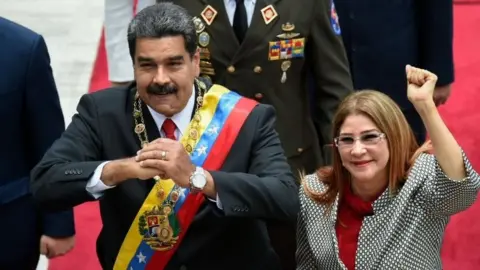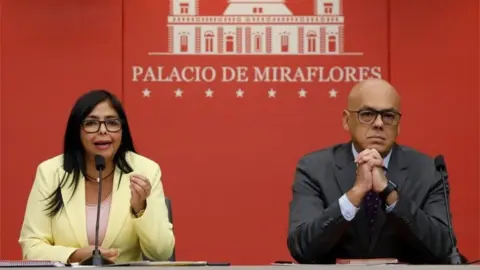US imposes sanctions on Venezuela's First Lady Cilia Flores
 AFP
AFPThe US treasury department has imposed financial sanctions on Venezuela's First Lady, Cilia Flores.
The move comes just over a year after President Nicolás Maduro had his assets frozen by the US government.
US treasury chief Steve Mnuchin said the Venezuelan "regime systematically plunders what remains of Venezuela's wealth".
Mr Maduro later thanked the US in a televised address "for surrounding him with dignity".
In a speech at the United Nations in New York on Tuesday, US President Donald Trump said Venezuela was one of the "truly bad places" in the world. He also said Mr Maduro could be toppled "very quickly" if his own military decided to turn on him.
"It's a regime that frankly could be toppled very quickly by the military if the military decides to do that," Mr Trump said as he met on the sidelines of the UN General Assembly with Colombian President Ivan Duque.
Mr Maduro said Mr Trump's comments were an apology for America's history of colonialism in the region.
Surrounded by sanctioned officials who joined him during an event broadcast on state television, he said: "Thank you, Donald Trump, for surrounding me with dignity."
But he also said: "Don't mess with Cilia! Don't mess with family! Don't be cowards."

More on Venezuela's crisis:

Over the past two years, the Trump administration has imposed sanctions on dozens of Venezuelans, accusing them of corruption, drug trafficking and human rights abuses.
"We are continuing to designate loyalists who enable Maduro to solidify his hold on the military and the government while the Venezuelan people suffer," Mr Mnuchin said in statement.
The treasury department also placed Venezuelan Defence Minister Vladimir Padrino, Vice-President Delcy Rodríguez and her brother, Information Minister Jorge Rodríguez, on its Specially Designated Nationals list.
 Reuters
ReutersIt also seized a private Gulfstream jet worth $20m (£15.2m) belonging to Rafael Sarria, who according to the treasury department is a "front man" for Diosdado Cabello, the president of the National Constituent Assembly and an influential figure in the government.
Mr Cabello is already subject to US sanctions. The were imposed in July 2017, at the same time as those targeting President Maduro.
"Treasury will continue to impose a financial toll on those responsible for Venezuela's tragic decline, and the networks and frontmen they use to mask their illicit wealth," the statement reads.
The statement also said that the sanctions could be lifted if those named "take concrete and meaningful actions to restore democratic order, refuse to take part in human rights abuses, speak out against abuses committed by the government, and combat corruption in Venezuela".
Mounting pressure
It is not the first time the US has accused the Venezuelan government of corruption. Two weeks ago, a US treasury official said Venezuela's government was stealing from a state-run food programme while its people went hungry.
Pressure on Venezuela has also been growing within Latin America. Food shortages and a widespread economic and political crisis have driven 2.3 million Venezuelans out of their homeland since 2014, many of them to Colombia, Ecuador, Peru and Chile.
Countries in the region say they are struggling to cope with the influx of Venezuelans and a group 14 Latin American and Caribbean countries as well as Canada, known as the the Lima Group, are due to meet on Tuesday in New York to discuss how to deal with the mass migration.
Peru's foreign minister announced last week that his country - along with Argentina, Chile, Colombia and Paraguay - would ask the International Criminal Court to start a preliminary investigation into alleged crimes against humanity in Venezuela.
